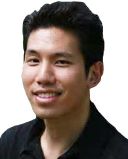
Young Albert Einstein
This, like many other questions, does not have an easy answer. Some would say that we will never find another Einstein and perhaps we shouldn't even try. Others might say that we won't find the next Einstein because he will find us. He did, after all, surprise us with his shockingly creative gedankenexperiments and theory of relativity. And he captured our imaginations through his personal charm and his gravity defying hair. Arthur C. Clarke's famous third law states that "Any sufficiently advanced technology is indistinguishable from magic." Perhaps it was Einstein's mind, and the way he considered questions that were in an alternate dimension, that allows us to reserve for him the term genius, because the way he thought, at least for most of us, feels like it could only be intellectual magic.
But is a genius really a magician whose performance baffles our imaginations? Or are they human but simply so far out on a continuum, perhaps like Tiger Woods is for golf, that we can't begin to imagine they are like the rest of us? However, what if we could find people, perhaps not names we would immediately associate with genius, but who are outstanding achievers of our time. And what if we could find them using a standardized test?
Consider these names. What do Facebook's Mark Zuckerberg, Google's Sergey Brin, and Stefani Germanotta have in common? They all took the Scholastic Assessment Test (SAT) in the 7th grade and scored high enough to attend a summer program for intellectually talented youth. Now why would they do that? Most of us take the SAT for the first time as a high school Junior. Well it turns out that for over 200,000 students each year who are age 12 (or younger), typical in-grade standardized tests are simply too easy and won't distinguish the typical smart kid from the exceptionally brilliant one. Therefore, these students are given the SAT (or ACT) at talent search centers across the country, including the one at which I am a research scientist, the Duke University Talent Identification Program. And a handful of these remarkable students even ace the test at this age. Consider Terence Tao, Professor of Mathematics at UCLA and winner of the Fields Medal, the equivalent of the Nobel Prize in Math. At the age of 8, he scored 760 on the SAT-Math. Or take Lenhard Ng, Assistant Professor of Mathematics at Duke University. At the age of 10 he scored a perfect 800. But these are only some examples you might say, and the plural of anecdote is not data. So what about systematic studies of these intellectual Outliers?
The Study of Mathematically Precocious Youth (SMPY), currently co-directed by Camilla Benbow and David Lubinski of Vanderbilt University, has been systematically studying these intellectual giants longitudinally since the early 1970's, and this research team has found that the majority of these high scoring students are exceptionally successful in the areas of education, work, and life achievement and quite well adjusted socially. Not that every student has co-founded a company like Facebook or Google, becomes Lady Gaga, or won the Fields Medal. But overall, SMPY has uncovered that these students are in many ways inventing things and attaining positions of influence. They are making up a large part of what Richard Florida would call The Creative Class.
I hope to share with you what I think are important research findings surrounding the search for great intellectual and creative talent. I will examine the role of cognitive abilities and other variables on which people differ (and on which they are similar) in relation to the talent development process, how this process unfolds, and perhaps how research investigating this process might provide some clues about how talent is developed such that outstanding achievement in school, work, and life becomes a reality. I will draw upon studies from various disciplines including education, psychology, economics, sociology, and statistics in an attempt to convey some of the findings both in the past and present that might help explore the talent development process. My goal is for you, the reader, to be able to draw from this body of knowledge to better understand that the beauty in the way that people individually differ offers an insightful lens not only into the mind but also into the patterns that we see in our interactions with others in everyday life.
This Blog is titled Finding the Next Einstein not because testing students at an early age will guarantee discovery of the next Einstein-like genius. Surely there are extraordinary minds that this method will miss. But this way of searching for intellectual and creative talent will likely find a large number of people who already have or will change our world. And we should remember that as much as we want to find the next Einstein, the next Einstein will need to find, just like all of us, him or herself. So we will shoot for Einstein's universe, and perhaps if we are lucky, we might end up discovering some important intellectual stars along the way. Smart, after all, is relative.
© 2011 by Jonathan Wai
You can follow me on Twitter, Facebook, or G+. For more of Finding the Next Einstein: Why Smart is Relative go here.


